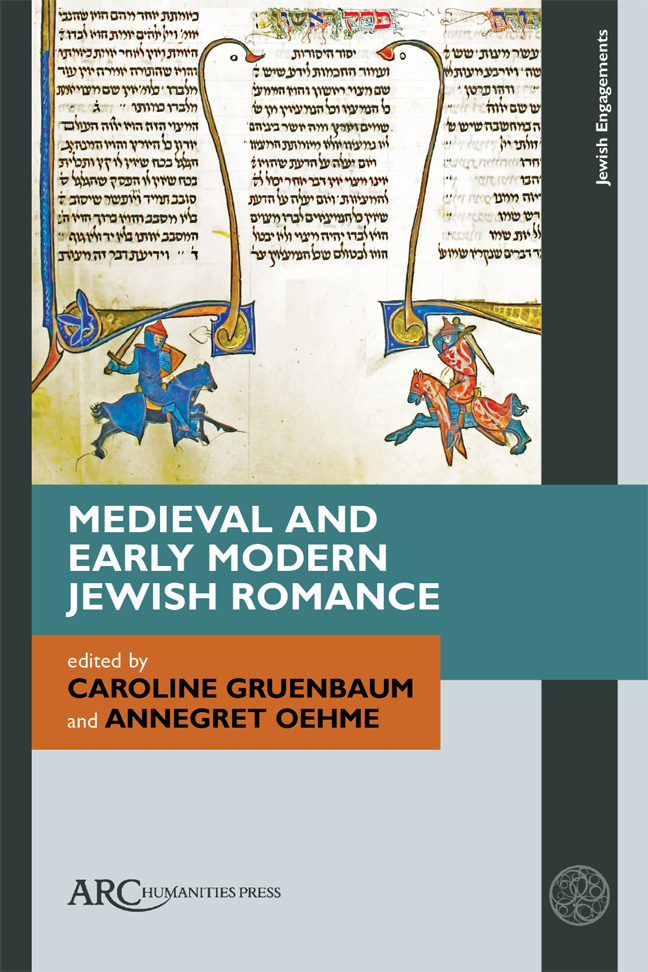Book contents
- Frontmatter
- Dedication
- Contents
- List of Illustrations
- Acknowledgements
- Introduction
- The Zohar as Medieval Jewish Romance
- Letters of Loathing: Immanuel of Rome and Romance Epistolary
- Illuminated Knights and Tales of Romance in the Rothschild Miscellany
- The Queen Nudatio: A Romanesque (?) Topos in Israel Caslari's Roman d’Esther
- At the Court of the Demon King: The Story of the Jerusalemite and Chivalric Romance
- Melekh Artus as a Jewish Romance: Horizons of Expectation and Genre Configurations
- A Friend in Need is a Friend Indeed?Friendship, Love, and Loyalty in the Yiddish Seven Sages of Rome
- Stealing Back One's Husband: The Yiddish Mayse mi-Danzek in the Context of Early Modern German Cross-Dressing Narratives
- Romance Elements in Meshal Haqadmoni by Isaac Ibn Sahula: A New Reading
- Afterword: Jewish Romance in Search of Identity
- Select Bibliography
- Index
Afterword: Jewish Romance in Search of Identity
Published online by Cambridge University Press: 18 February 2024
- Frontmatter
- Dedication
- Contents
- List of Illustrations
- Acknowledgements
- Introduction
- The Zohar as Medieval Jewish Romance
- Letters of Loathing: Immanuel of Rome and Romance Epistolary
- Illuminated Knights and Tales of Romance in the Rothschild Miscellany
- The Queen Nudatio: A Romanesque (?) Topos in Israel Caslari's Roman d’Esther
- At the Court of the Demon King: The Story of the Jerusalemite and Chivalric Romance
- Melekh Artus as a Jewish Romance: Horizons of Expectation and Genre Configurations
- A Friend in Need is a Friend Indeed?Friendship, Love, and Loyalty in the Yiddish Seven Sages of Rome
- Stealing Back One's Husband: The Yiddish Mayse mi-Danzek in the Context of Early Modern German Cross-Dressing Narratives
- Romance Elements in Meshal Haqadmoni by Isaac Ibn Sahula: A New Reading
- Afterword: Jewish Romance in Search of Identity
- Select Bibliography
- Index
Summary
FEW LITERARY-CULTURAL GENRES have achieved such an abundance of studies as that of the romance. Attempts have been made by literary scholars, historians, anthropologists, and those from other disciplines to draw the boundaries and understand the contexts in which romances were created and developed. As the main goal of the present collection of critical essays is to suggest new venues for the study of Jewish medieval and early modern romance, it will be sufficient to turn, if needed, to that large body of research, for theoretical and historical questions and the study of specific romances.
The multitude of definitions of medieval romance literature can be roughly divided into two subgroups. In the first one are the historical definitions of the genre, which could be summarized as: “tales of chivalric adventure written in romanz (French medieval vernacular) in Christian Europe between the twelfth and the sixteenth centuries.” The second group of definitions is mainly generic: they do not bond the romance to a specific period, space, language, or ethos (for example, chivalric or courtly culture), but to certain literary characteristics which could be achieved in any time, place, and language. The first group of definitions cannot, of course, be applied to Jewish culture, which was present on the margins or even outside the historical definition of romance. Jews rarely wrote in languages other than Hebrew (and Yiddish), and were mostly excluded from participating in the chivalric world.
The question whether medieval or early modern Jews were familiar with romance literature is no longer, in the present state of research, unanswerable. This has been established in previous studies from decades ago, and after the present collection, it has now become a fact that Jews knew romance. The paths by which medieval Jews were familiar with romance literature were wide-ranging—reading romances in vernacular languages (French, Italian, Spanish, Provençal), listening to oral storytelling or singing of narratives in town markets, during long voyages of merchants on sea and land, or while working in city workshops and farms. Even the question of what attracted Jews to romance literature is no longer an interesting one. We have begun to understand medieval Jews as human beings, and not only religious objects.
- Type
- Chapter
- Information
- Medieval and Early Modern Jewish Romance , pp. 197 - 207Publisher: Amsterdam University PressPrint publication year: 2023

